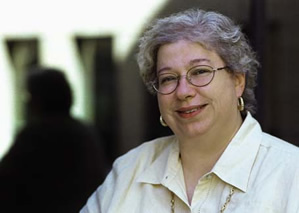| Prof analyzes presidential election | Randy Snow joins Olympic Hall | Distinguished alumni named |
 |
||
| Home Forethought Campus Buzz Feature Stories Re:Search The Score Alum News Yesteryear | ||
Ask the major players in higher education psychology circles and they'll tell you: Professor Robert Gatchel is one of the most respected scholars and researchers in the world.
 |
| Nursing Professor Beth Mancini is one of 46 faculty members hired this fall with funds generated, in part, from an increase in tuition. Medical Center of Arlington donated her salary base for three years. |
He recently received the American Psychological Association's prestigious Distinguished Professional Contributions to Applied Psychology award. He has conducted extensive clinical research--much of it supported by grants from the National Institutes of Health--on the assessment, treatment and prevention of chronic medical disorders with an emphasis on chronic pain.
Add to that the 225-plus scientific articles, 73 book chapters and 22 books he's written, and it's easy to see why Dr. Gatchel is considered a heavyweight. UTA's increased emphasis on research is among the reasons he accepted an offer to chair its Psychology Department.
"The new research initiative to make UTA a tier one university was a major factor," he said. "I have always wanted to become involved in more administrative activities, such as being a chairman, at a traditional academic institution that's on the rise such as UTA."
Gatchel joins 45 other professors this fall as new members of the UTA faculty. Provost Dana Dunn says all the recent hires have impressive credentials.
"Some are first-time faculty with degrees from top institutions; others are experienced senior faculty from high-quality research universities. Their addition is an important step in building excellence at UTA and attaining tier one status."
To expand the faculty, the University used funds generated after the Legislature transferred tuition-setting authority to universities last spring. The flexibility to set its own tuition also allowed UTA to invest more than $2 million in classroom and laboratory facilities and utility infrastructure renewal and to address several deferred maintenance projects.
UTA's 18-member Tuition Review Committee, which included 10 students, recommended tuition increases beginning last spring. Student Congress President Casey Townsend, who chairs this year's committee, was initially skeptical about the hikes but now sees the advantages.
"We wouldn't have had enough funding to hire the new faculty members without tuition deregulation, and we couldn't have pursued our goal of becoming a top research institution," he said. "The nearly 50 new faculty are tremendously needed as UTA tries to keep pace with increasing enrollment."
Senior Denis Gjoni and his fellow Honors College classmates discussed the tuition increases with their dean, Robert McMahon.
"Dr. McMahon told us, 'Your degree in 10 years is as good as your university in 10 years. See this as an investment. It will be one of the best ones you make,' " said Gjoni, president of the Honors College Council. "And I have seen the results. The new computer science and engineering faculty are reputable professors from industry or other tier one schools. Labs are getting better, and financial aid is helping subsidize the increase for those who qualify."
Legislators mandated that 20 percent of the revenue generated from tuition increases be set aside for financial aid. This resulted in more than $3.3 million in new financial aid funds for UTA students, who can earn an additional $3-per-semester-credit-hour discount by paying their tuition and fees before the first day of class.
Many UTA students' expenses aren't much higher than before, noted UTA President James D. Spaniolo. Significant financial aid is still available in the form of grants, tax credits, fellowships or scholarships from the government or the University.
"Our students understand that the quality of their educational experience hinges on our ability to attract and retain the strongest faculty," Spaniolo said.
Take Beth Mancini, for example, whose three-year salary base was donated by Medical Center of Arlington and supplemented by enhanced tuition. She joined the School of Nursing this fall as a professor and associate dean for undergraduate programs. A Ph.D. graduate of UTA's School of Urban and Public Affairs, she was a senior vice president at Parkland Health & Hospital System in Dallas and has completed a Johnson & Johnson Wharton Nurse Executive Fellowship at the University of Pennsylvania and a National Association of Public Hospitals Management Fellowship through New York University.
During the last 20 years, she has worked with the School of Nursing on numerous initiatives.
"I have watched the school grow and have always found the faculty and administration to be creative and forward thinking," she said. "The opportunity to work on a team that is focused on developing the professional nurse of the future was a challenge that I could not resist."
Similar opportunities await the rest of UTA's top-notch new faculty.
— Mark Permenter
| Archives
| Alumni Association |
Giving to UTA | UTA
Home Copyright © 2004 UTA Magazine. All rights reserved. |